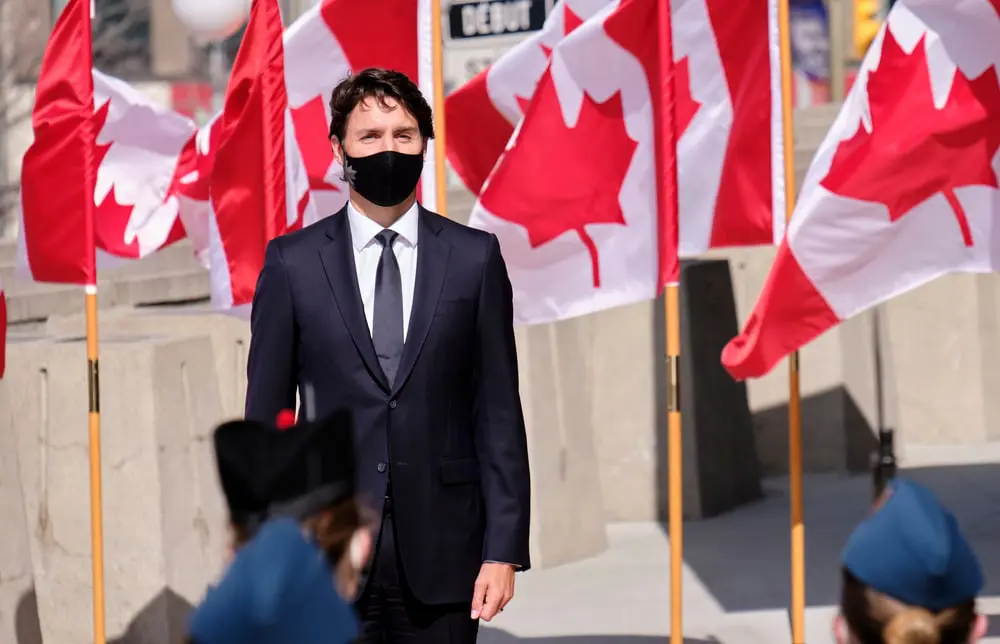
For the first time in Canadian history, the federal government invoked the Emergencies Act in response to the ongoing trucker blockades and anti-vaccination protests. In a news conference on February 14th, Canadian Prime Minister Justin Trudeau stated that “it is now clear that there are serious challenges to law enforcement’s ability to effectively enforce the law.” He continued:
It is no longer a lawful protest at a disagreement over government policy. It is now an illegal occupation. It’s time for people to go home.
The Emergencies Act grants the government extraordinary powers for 30 days, including the power to prohibit public assembly, travel, and the use of specific property. It will allow the Canadian government to take a variety of steps, including freezing of bank accounts of protesters and clearing blockades caused by trucks, mostly in Ottawa, but also in Alberta and Manitoba.
Besides striving to remove blockades, the government is making a concerted effort to cut protesters from their financial supply lines. After the initial funding efforts via the crowdfunding platform GoFundMe had been shut down by GoFundMe itself, protesters moved on to the Christian crowdfunding site GiveSendGo.
But now, as the Finance Minister Chrystia Freeland announced, crowdfunding platforms and their payment service providers must register with the Financial Transactions and Reports Analysis Centre of Canada (FINTRAC), the national financial intelligence agency. They must also report large and suspicious transactions to FINTRAC.
Freeland explained, that “the illegal blockades have highlighted the fact that crowdfunding platforms, and some of the payment service providers they use, are not fully captured under the Proceeds of Crime and Terrorist Financing Act.” She further expanded:
We are making these changes because we know that these platforms are being used to support illegal blockades and illegal activity which is damaging the Canadian economy.
A second measure aimed at combating the financial lifelines of protesters now enables Canadian financial institutions to “temporarily cease providing financial services where the institution suspects an account is used to further the illegal blockades and occupations,” Freeland said. “This order covers both personal and corporate accounts.”
In a third step announced by Freeland, Canadian financial institutions are now being directed “to review their relationships with anyone involved in the illegal blockades” and to report them to the authorities.
As of today, a bank or financial service provider will be able to immediately freeze or suspend an account without a court order. In doing so, they will be protected against civil liability for actions taken in good faith.
According to Freeland, federal government institutions will have a “new broad authority” to share “relevant information” with banks and other service providers to ensure “we can all work together to put a stop to the funding of these illegal blockades.”
It has also been announced that insurances of truck owners will be revoked. Freeland ended her statement by announcing:
If your truck is being used in these illegal blockades, your corporate accounts will be frozen.
The Emergencies Act defines a national emergency as a temporary “urgent and critical situation” that “seriously endangers the lives, health or safety of Canadians and is of such proportions or nature as to exceed the capacity or authority of a province to deal with it.” It replaced the War Measures Act in the 1980s. According to the New York Times, the decision by Justin Trudeau marked the first invocation of emergency powers since his father, Prime Minister Pierre Elliott Trudeau, imposed them during a terrorism crisis in Quebec almost 52 years ago.
Four different types of emergencies are outlined by the Emergencies Act: public welfare emergencies, public order emergencies, international emergencies, and war emergencies. Once the cabinet declares an emergency, it takes effect right away—but the government still needs to go to Parliament within seven days to get approval. If the legislation is invoked this week, it will likely be under the ‘public order’ category, a BBC report speculates. The criteria, however, are strict—lawful protests do not qualify. Instead, the situation must be considered a threat to the security of Canada, as defined by the Canadian Security Intelligence Service Act. This law outlines four possible scenarios:
It is so far unclear which scenario Trudeau would rely on to justify the use of the Emergency Act, since none of these four scenarios have been clearly present in Ontario.
Interim Conservative Leader Candice Bergen accused Trudeau of dividing Canadians.
“We’ve seen the prime minister wedge, divide, and stigmatize Canadians he doesn’t agree with and by doing so he creates so many barriers in terms of trying to solve this problem,” she said.
Conservative MP Pierre Poilievre voiced similar criticism: “Real simple. Listen to the science, do what other provinces and countries are doing, that is to end the mandates and restrictions so protesters can get back to their lives and their jobs.”
The spokesman of the Freedom Convoy, Benjamin Dichter, wondered in turn what the truckers are guilty of. “Some trucks parked illegally?” Dichter asked, “I’m not sure that that warrants the response from the government.” According to Dichter the truckers did not feel intimidated by Trudeau’s threats. When the prime minister said he was not going to call in the military, the truckers “were all laughing.”
Our response was, “Yeah, you tried that last week and the military said, ‘Thanks, but no thanks – this is not within our purview.” … So you know what they say? A general without an army is a fool. Justin Trudeau just hasn’t realized that yet.
